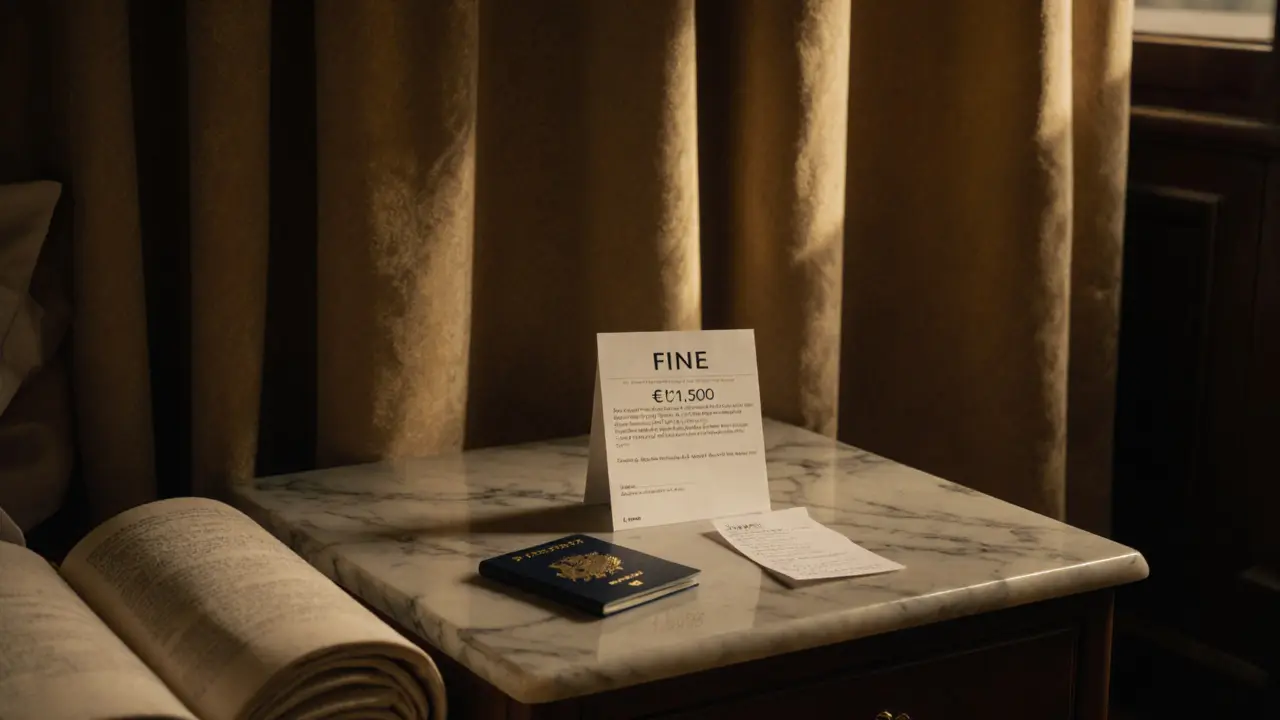The Legal Aspects of Hiring an Escort in Paris: What You Need to Know

Walking through the streets of Paris, you might see ads for companionship services-elegant photos, polished profiles, promises of dinner, culture, or conversation. But if you’re thinking about hiring an escort in Paris, you need to understand one thing: escort in Paris isn’t illegal, but almost everything around it is.
What’s Actually Legal in France?
France doesn’t criminalize the act of selling or buying sexual services. That’s right. If a person offers their time, company, or even intimate contact in exchange for money, they aren’t breaking the law by doing so. The law targets the environment around sex work, not the transaction itself.Since 2016, France has followed the Nordic model. This means clients can be fined, but sex workers are treated as victims, not criminals. If you pay for an escort, you’re breaking the law-not because you’re getting sex, but because you’re funding an industry that the state considers exploitative.
That fine? It’s €1,500 for a first offense. Repeat offenders face up to €3,750 and possible community service. Police don’t go door-to-door hunting clients, but they do conduct sting operations, especially near tourist zones, train stations, and popular nightlife areas. There have been documented cases where tourists were pulled over after booking online and fined on the spot.
What Makes an Escort Service Illegal?
Here’s the catch: while paying for sex isn’t technically illegal under French law, almost every way you’d normally find or access an escort is.Operating an escort agency? Illegal. Advertising sexual services online? Illegal. Running a brothel? Illegal. Even renting an apartment to use as a regular meeting spot for clients? Illegal. The law doesn’t just ban the act-it bans the infrastructure that makes it easy.
That’s why most escorts in Paris work alone. They don’t have websites with booking systems. They don’t post on platforms like Backpage or Reddit. They rely on word-of-mouth, private networks, or encrypted apps like Signal or Telegram. If you see a website that looks like a professional agency with photos, prices, and availability calendars, it’s either a scam or operating illegally. And if you book through it, you’re not just risking a bad experience-you’re risking a fine.
How Do People Actually Find Escorts in Paris?
You won’t find them on Google. You won’t find them on Instagram. You won’t find them on TripAdvisor.Most legitimate escorts in Paris use private networks. They’re introduced by trusted contacts. Some use encrypted messaging apps to screen clients before meeting. Others rely on expat communities or long-standing client lists. There are no public directories. No reviews on Yelp. No ratings on Booking.com.
If you’re searching online and find a site that says “Top Escorts in Paris 2025” with photos and prices, you’re looking at a scam. These sites are designed to collect your credit card info or personal details. Some even lead to blackmail schemes. In 2024, French authorities shut down over 300 fake escort sites targeting tourists. Many of these sites used stolen photos of real people-some of whom had no idea they were being used.
Real escorts rarely advertise. They don’t need to. Their reputation keeps them busy. If you’re asking how to find one, the answer is simple: you don’t. Not safely, not legally, and not without serious risk.

What Happens If You Get Caught?
Let’s say you book someone through a sketchy website, meet them in a hotel, and pay €300 for an evening. You think it’s private. You think no one will know.Here’s what could happen:
- Police conduct random checks in hotels. They don’t need a warrant to ask for ID and inquire about your activities.
- If the escort reports you (and many do, especially if they feel unsafe), you’ll be flagged.
- If you’re caught paying for sex, you’ll be issued a fine on the spot or summoned to court.
- Your passport may be checked. If you’re a foreigner, the fine is still enforceable-you’ll have to pay before leaving the country.
- Some tourists have been denied future Schengen visas after being caught.
There’s no jail time for first-time clients, but the fine is non-negotiable. And unlike a parking ticket, it shows up on your record. If you ever apply for a long-term visa, work permit, or residency in any EU country, this could come up.
Is There a Safe Way to Hire an Escort in Paris?
No.There’s no legal, safe, or low-risk way to hire an escort in Paris. The system is designed to make it difficult-and it works. Even if you find someone who claims to be “legal,” they’re either lying or misunderstanding the law.
Some people try to justify it by saying, “I’m just paying for company.” But the law doesn’t care about your intention. It cares about the outcome. If money changes hands and there’s any expectation of sexual activity-even if it’s unspoken-you’re breaking the law.
And here’s something no one tells you: most escorts in Paris are not there by choice. Many are migrants, often from Eastern Europe, Africa, or South America, with limited options and little support. The system they’re trapped in isn’t glamorous-it’s dangerous. The fines target clients not because the state is moralistic, but because they want to cut demand to protect vulnerable people.

What Are the Alternatives?
If you’re in Paris and looking for companionship, there are legal, safe, and culturally rich alternatives.- Join a local language exchange group. Many Parisians are happy to meet foreigners over coffee.
- Take a guided walking tour with a historian or local guide. You’ll learn more about the city than any escort ever could.
- Visit a café in Montmartre or Le Marais and strike up a conversation. Parisians are often warm once you show genuine interest.
- Use apps like Meetup or Bumble BFF to connect with locals who want to explore the city together.
These options don’t come with legal risk. They don’t come with hidden fees. And they give you something real-a connection, a memory, a story.
What About the “High-End” Escorts?
You’ve seen the Instagram posts: women in designer dresses, champagne, art galleries, Michelin-starred dinners. They make it look like luxury.But here’s the truth: even the most “exclusive” escorts in Paris are operating illegally. There’s no such thing as a licensed, regulated escort service in France. If someone claims to be “high-end” or “VIP,” they’re just marketing. The law doesn’t make exceptions for price, appearance, or perceived sophistication.
And the risks are higher. These clients often pay thousands. That means more pressure on the escort. More secrecy. More vulnerability. More chance of exploitation. And if something goes wrong-say, you get into an argument or feel unsafe-you can’t call the police without risking your own arrest.
Final Reality Check
Hiring an escort in Paris isn’t a romantic fantasy. It’s a legal gamble with real consequences. The fines are steep. The scams are common. The human cost is high.You might think you’re being discreet. You might think you’re just one person. But every client fuels a system that preys on the vulnerable. And in a city as beautiful as Paris, there are better ways to spend your time, your money, and your energy.
If you want companionship, connection, or even a little adventure-look for it where it’s safe, legal, and human. Not in the shadows, but in the light.
Is it legal to hire an escort in Paris?
No, it is not legal to hire an escort in Paris. While the act of selling sexual services isn’t criminalized, paying for sex has been illegal in France since 2016 under the Nordic model. Clients can be fined up to €1,500 for a first offense. The law targets demand, not the person offering the service.
Can I get fined for hiring an escort in Paris as a tourist?
Yes. Tourists are not exempt from French law. Police have conducted operations targeting foreign clients, especially near tourist areas and hotels. Fines are issued on the spot or through court summons, and payment is required before leaving the country. Some tourists have been denied future Schengen visas after being caught.
Are escort agencies legal in Paris?
No. Operating an escort agency, advertising sexual services online, or managing multiple workers for paid companionship is illegal in France. Any website, app, or social media profile that lists escorts with prices or booking options is operating illegally and is likely a scam.
How do real escorts in Paris find clients?
Most work alone and rely on private networks, encrypted messaging apps like Signal or Telegram, or word-of-mouth referrals. They avoid public platforms entirely. If you find someone through Google, Instagram, or a booking site, they’re either a scammer or breaking the law.
What should I do if I’m approached by an escort in Paris?
Politely decline and walk away. Do not engage in conversation about services or payment. Even asking questions can be used as evidence in investigations. If you feel threatened or harassed, contact local authorities or your embassy. Do not attempt to negotiate or arrange a meeting.
Are there any legal companionship services in Paris?
Yes. Legal alternatives include hiring a private tour guide, joining language exchange meetups, using friendship apps like Bumble BFF, or attending cultural events where you can meet locals. These options offer connection without legal risk or exploitation.





